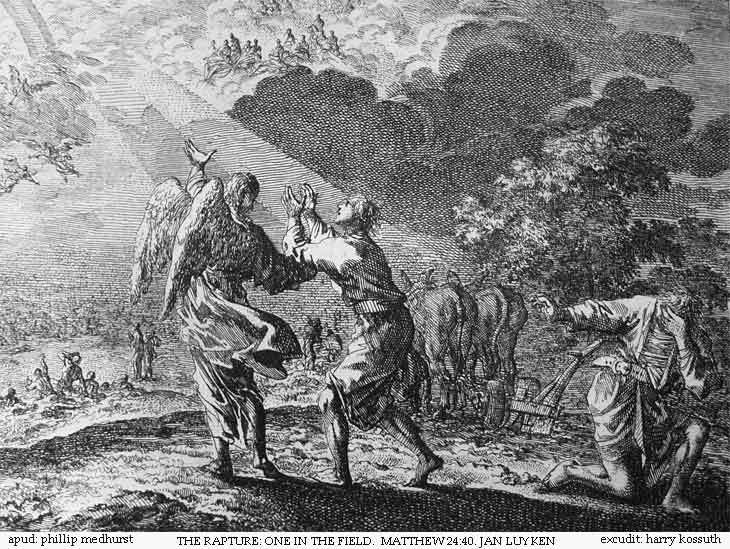Matthew 24:36-42 says:
But of that day and hour [of the coming of the Lord] knoweth no man, no, not the angels of heaven, but my Father only. But as the days of Noe were, so shall also the coming of the Son of man be. For as in the days that were before the flood they were eating and drinking, marrying and giving in marriage, until the day that Noe entered into the ark, and knew not until the flood came, and took them all away; so shall also the coming of the Son of man be. Then shall two be in the field; the one shall be taken, and the other left. Two women shall be grinding at the mill; the one shall be taken, and the other left.
Watch therefore: for ye know not what hour your Lord doth come.
Some people refer to this passage and somehow get the idea that exactly 50% of everyone will make it into the Kingdom of Heaven. Half go up, and half go down. Some others see this as a kind of Rapture that is to occur in the future -- where the more righteous half will be taken up prior to a period of "tribulation" among the not-so-righteous.
I, personally, think that piece of scripture is much more about being prepared, as we know not when Christ will come. But let's explore further this idea of the 50%.
First, notice the use of the word "taken" in the full context. When talking about the flood and the ark, Jesus seems to use "took them all away" as a bad thing -- as in, the water swept them away. And then he uses the same word (though conjugated differently) saying twice: One shall be taken, and the other left. If the original word holds true, then I think I'd want to be the one left behind, as to "be taken" may mean to "be swept away."
But either way: whichever of the binary you choose to believe, the meaning is the same: one will be saved and the other one cursed. So, let's talk in terms of being saved. I'll let you decide on your own for now what "being saved" means -- maybe we'll explore that question in a later post.
So, will only 50% be saved? I don't think the scripture is meant to show an actual ratio. I think it's only to depict that you can have two people standing in a field -- very similar to each other -- working away, similar desires, possibly similar builds -- in other words, no evident way to distinguish between the two. But yet, the Lord saves one and not the other -- for it's what's inside that matters.
As for actual numbers -- it could be more than 50% saved, and it could be less. We have no way of knowing whether it the 90% range, or more in the 10% range. But I do know that it's not a 50/50 thing -- whoever does better than 50% of others will be saved -- as this doesn't make any philosophical sense. I know that we will be saved on our own merits, and not in comparison to other people's merits -- in other words, we're not going to be graded on a curve. Otherwise we could end up tempting others to do evil as a way to get ourselves into heaven.
So, now we've lost the meaning of 50%, the question now becomes: Who exactly will be saved?
Here, there is a very subtle meaning in the parable -- it doesn't matter what church one may or may not belong to. Jesus might as well have said: "There will be two sitting in a church service, and one shall be taken, and the other one left." No way to distinguish between the two churchgoers, but one is more ready to be saved than the other.
It isn't knowledge that will save us. At one time when Jesus was casting out some devils, they spoke and testified that they knew he was the Son of God -- but that knowledge alone didn't save them. And yet I see many times over in several religious debates: "We will be saved and you won't be saved because you are wrong." When in actuality, Jesus is warning: It's not a test on knowledge, but rather, it's a test on what you do with the knowledge given you, and how we treat other people. Are you willing to do the preparations and be ready to be saved when the time comes?
So in summary: we don't know how many will be saved. Belief, by itself isn't sufficient, unless we internalize it and allow it to change us. We will not be graded on the curve -- we will be saved on our own merits. And are we ready?

No comments:
Post a Comment